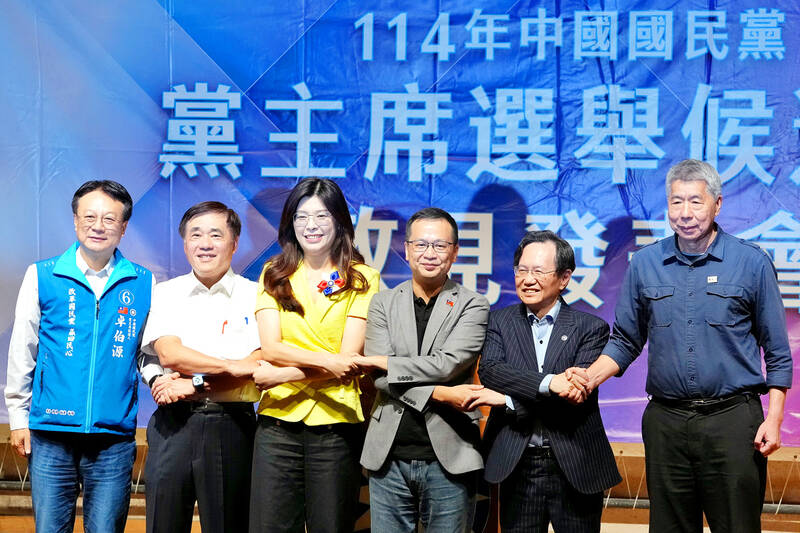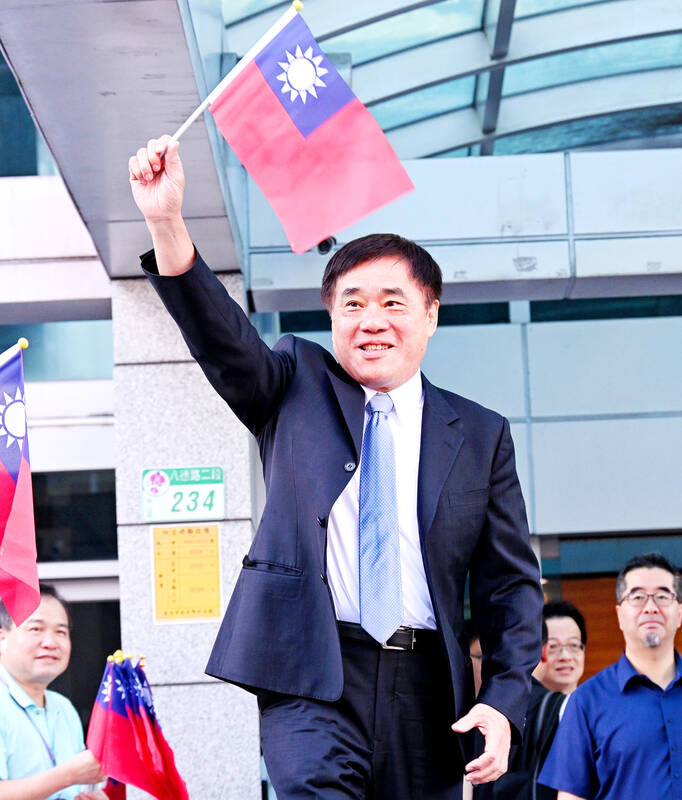Jaw Shaw-kong (趙少康), media mogul, television personality and former vice presidential candidate, on Saturday rode to the rescue of his long-time comrade, former Taipei Mayor Hau Lung-bin (郝龍斌) in his lackluster bid to win the Chinese Nationalist Party (KMT) party chair election.
In a post on Facebook on Thursday last week, Hau claimed to be the victim of a cyberwarfare campaign. He said that according to public relations firms he had commissioned to investigate, they estimated it must have cost “nearly NT$100 million” (US$3.3 million).
“The attacks I received exceeded the so-called Democratic Progressive Party (DPP) “1450” (internet army)’s battle strength,” he said, and questioned: “Is it mobilized by candidates inside our party?”

Photo: Chen Yi-kuan, Taipei Times
“What I worry about most is that there are too many foreign IP addresses,” he added.
The term he used for “foreign” literally means “outside our borders” (境外), which, according to his “one China” ideology, could include Communist China.
His post came across as pre-emptively casting about for outside forces to pin the blame on if he loses. Initially, the response was muted; it was hard to know what to make of such vague, conspiratorial-sounding insinuations.

Photo: Fang Pin-chao, Taipei Times
Jaw gave the insinuations legs, calling out China explicitly for interfering in the KMT chair election and sharing numbers and specific allegations to make the case. Among his data points, he claimed that of the 1790 posts on TikTok created in the last month on the KMT chair race, 58 percent were devoted to popular frontrunner Cheng Li-wun (鄭麗文).
He described fresh IP addresses and YouTube channels allegedly created within three weeks of Hau declaring his run to spread AI content to attack him. Hau has since said that this has been “confirmed by police,” and called on them to investigate their origin.
Jaw trotted out an obviously AI-created video of Hau on stage kissing KMT Taipei City Councilor Liu Tsai-wei (柳采葳), who has since filed a lawsuit, stating she felt “disgusted” and “grieved.” He also ignited discussion across the political spectrum by calling for a national security investigation.
JAW PROVOKES TALK
This provoked outrage within the KMT that their election was being interfered with by the Chinese Communist Party (CCP). The DPP reaction was a mixture of exasperation, bemusement and a bit sarcastic in an eye-rolling “oh, so you’re finally figuring out the CCP meddles in our elections” sort of way. They pointed out that some of the legal revisions they have been proposing are intended to try to stop this sort of cognitive warfare, and the KMT had blocked them.
That the CCP has been trying to influence elections in Taiwan is not a surprise to anyone, but on the KMT side, it seems less serious because much of it sounds reasonable and could be homegrown — after all, it is often their own talking points being amplified.
The idea that the CCP would interfere in their own internal chair election genuinely outraged many in the KMT. By definition, the KMT is pro-China, but being pro-CCP is another matter. Even those who are more pro-CCP in the party were undoubtedly upset at the possibility that they would do something so blatantly stupid.
A candidate close to the CCP, Chang Ya-chung (張亞中) said he had faith the “Chinese side” would not interfere.
Unsurprisingly, Jaw’s move shifted the focus and pressure to Cheng — though Jaw has made clear he was not aiming at her. She said that it was not her impression that there was any interference and that this was a phenomenon of today’s AI internet era. She dismissed this as a national security issue.
BUT WHY?
There is no proof of CCP interference, and Cheng may be right. On the other hand, the CCP has a long history of cognitive warfare stretching back to their successful effort to bring down the KMT in the Chinese Civil War.
But why would the CCP take such a risk?
Tinkering in the election would be less risky and more par for the course. Though they can easily afford it, splashing out nearly NT$100 million, as Hau alleges, would inevitably raise — ahem — red flags.
The easiest and cheapest way for the CCP to conquer Taiwan is to integrate to the point where Taiwan is effectively a vassal state, then wear down resistance to formalizing the relationship through negotiation. Those most amenable to this strategy are more likely to back the KMT, and all of the KMT candidates are promoting more economic integration, peaceful exchanges and a willingness to meet with Chinese leaders.
Cheng is almost certainly Beijing’s preferred candidate. She has previously supported former KMT Chairwoman Hung Hsiu-chu’s (洪秀柱) “one China, same interpretation” formula and last Wednesday vowed to make every Taiwanese “proud to call themselves Chinese.” In response, Hau identified himself as both Taiwanese and Chinese, specifying that his “China” is the Republic of China and explained his stance that cultural Chinese identity stems from “the Chinese root of Taiwanese culture,” which he said should not be conflated with political allegiance.
Hau’s foreign policy platform is (roughly translated) “pro-US but not kneeling to the US, peaceful towards China but not sucking up to the CCP, friendly to Japan but not fawning over Japan” (親美不跪美、和中不舔共、友日不媚日). In response, Cheng reiterated her support for “one China.”
Though Hau’s language is tougher than Cheng’s, he has always been for “reunification.” Cheng’s timeline would likely be smoother and faster if she got her way, but both share the same basic ideology.
Additionally, the KMT chair will likely be eclipsed by their presidential candidate in 2027 ahead of the 2028 national elections, and will be far more consequential ideologically and more powerful if the KMT regains power.
If they are meddling in this election, is it because they are growing impatient and want someone like Cheng to speed things along? Are they afraid Hau is tougher and more independent than he appears against the CCP?
This would not be a smart move by the CCP. KMT members are part of a democratic party, and do not take kindly to outside interference. Why would the CCP risk driving the KMT and DPP towards a consensus on national security?
It cannot be ruled out the CCP is doing this, hamfisted attempts to meddle in democracies they do not fully understand have happened before.
It also cannot be ruled out that Cheng is right, this is just the way it is in the AI era. She is the candidate drawing younger, more enthusiastic followers who would be far more likely to produce AI-generated content to support her.
The “kissing” video used by Jaw as proof of a nefarious plot has the opposite effect if one knows what is going on. Like photo filters before them, AI effects making two people kiss are common in many recent default AI effect suites in apps, usually alongside other standardized effects to make people fly like superheroes, being swarmed by puppies, or even being hugged by an AI Jesus.
This smells like someone simply ran the image through a standard AI effect app to be funny, rather than a well-thought-out smear campaign. If Hau had really done this on a crowded stage in front of an audience, we would know about it.
On the other hand, if Jaw and Hau’s allegations that many of the IP addresses and YouTube channels are emanating out of China, then that would strongly suggest that their claims have some merit.
There is another possibility: That this was cleverly crafted by Jaw and Hau to rally support.
Jaw’s calls for a national security investigation are warranted, and hopefully, the KMT will give its full support to strengthening the system to secure all of Taiwan’s elections.
Donovan’s Deep Dives is a regular column by Courtney Donovan Smith (石東文) who writes in-depth analysis on everything about Taiwan’s political scene and geopolitics. Donovan is also the central Taiwan correspondent at ICRT FM100 Radio News, co-publisher of Compass Magazine, co-founder Taiwan Report (report.tw) and former chair of the Taichung American Chamber of Commerce. Follow him on X: @donovan_smith.

The primaries for this year’s nine-in-one local elections in November began early in this election cycle, starting last autumn. The local press has been full of tales of intrigue, betrayal, infighting and drama going back to the summer of 2024. This is not widely covered in the English-language press, and the nine-in-one elections are not well understood. The nine-in-one elections refer to the nine levels of local governments that go to the ballot, from the neighborhood and village borough chief level on up to the city mayor and county commissioner level. The main focus is on the 22 special municipality

The People’s Republic of China (PRC) invaded Vietnam in 1979, following a year of increasingly tense relations between the two states. Beijing viewed Vietnam’s close relations with Soviet Russia as a threat. One of the pretexts it used was the alleged mistreatment of the ethnic Chinese in Vietnam. Tension between the ethnic Chinese and governments in Vietnam had been ongoing for decades. The French used to play off the Vietnamese against the Chinese as a divide-and-rule strategy. The Saigon government in 1956 compelled all Vietnam-born Chinese to adopt Vietnamese citizenship. It also banned them from 11 trades they had previously

Jan. 12 to Jan. 18 At the start of an Indigenous heritage tour of Beitou District (北投) in Taipei, I was handed a sheet of paper titled Ritual Song for the Various Peoples of Tamsui (淡水各社祭祀歌). The lyrics were in Chinese with no literal meaning, accompanied by romanized pronunciation that sounded closer to Hoklo (commonly known as Taiwanese) than any Indigenous language. The translation explained that the song offered food and drink to one’s ancestors and wished for a bountiful harvest and deer hunting season. The program moved through sites related to the Ketagalan, a collective term for the

As devices from toys to cars get smarter, gadget makers are grappling with a shortage of memory needed for them to work. Dwindling supplies and soaring costs of Dynamic Random Access Memory (DRAM) that provides space for computers, smartphones and game consoles to run applications or multitask was a hot topic behind the scenes at the annual gadget extravaganza in Las Vegas. Once cheap and plentiful, DRAM — along with memory chips to simply store data — are in short supply because of the demand spikes from AI in everything from data centers to wearable devices. Samsung Electronics last week put out word